LEAP Announces Fall 2021 Online Speaker Series
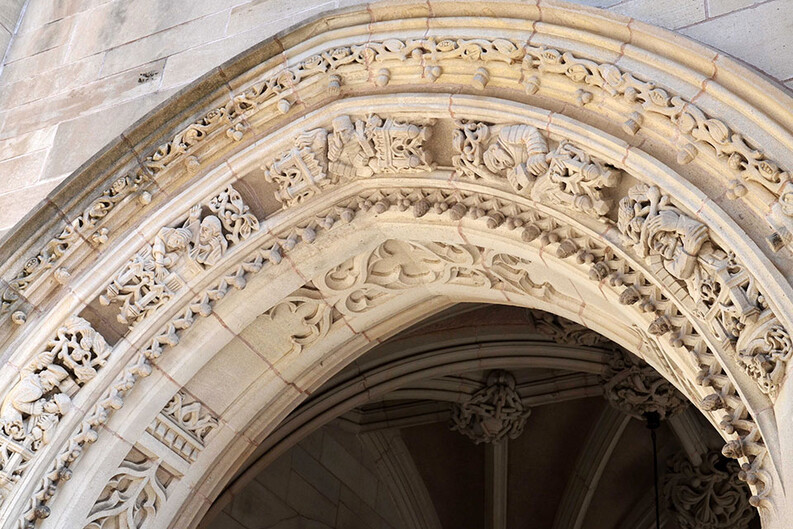
The Law, Ethics & Animals Program (LEAP) at Yale Law School went back into the classroom this semester for the first time in nearly a year and a half. While the return to in-person classroom instruction is a great opportunity to build community among LEAP’s students, the program is excited to announce that the fall term’s speaker series, like last year’s, will be a series of webinars open to the public. The online format will enable LEAP to connect speakers who are far from New Haven with audiences even farther away, knitting together a global community around the big questions of animal ethics and policy that LEAP tackles.
In that spirit, the first event will feature Australian philosopher Peter Godfrey-Smith speaking from Sydney about his new book Metazoa: Animal Life and the Birth of the Mind. Other events will feature leaders at the intersections of animals and photojournalism, antiracism, climate policy, and deep-sea ecology.
Read more about these events and register for them below.
Metazoa: Animal Life and the Birth of the Mind — A Book Talk with Peter Godfrey-Smith
Thursday, September 16, 12:15 p.m. to 1:15 pm ET
Register here for the webinar link: tinyurl.com/godfrey-smith
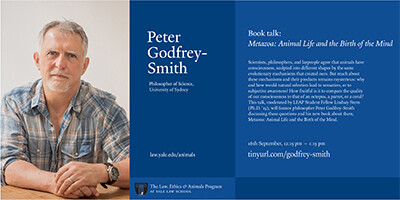
This event is presented as part of the Law, Ethics & Animals Program’s speaker series, in collaboration with the Yale Sustainable Food Program, the Yale Environmental Law Association, and the Yale Animal Law Society.
The Power of Photojournalism in Animal Advocacy, with Jo-Anne McArthur
Thursday, September 30, 12:15 p.m. to 1:15 pm ET
Register here for the webinar link: tinyurl.com/jo-anne-mcarthur
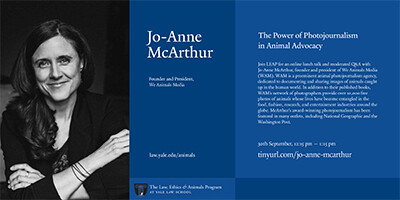
McArthur’s award-winning photojournalism has been featured in many outlets, including National Geographic and the Washington Post. She was the main subject of The Ghost in our Machine (2013), a documentary that followed her work to expose animal abuse through photography. The talk will be moderated by Manny Rutinel ’22.
This event is presented as part of the Law, Ethics & Animals Program’s speaker series, in collaboration with the Yale Sustainable Food Program, the Yale Environmental Law Association, the Yale Animal Law Society, and the Poynter Fellowship in Journalism.
Antiracism in Animal Advocacy with Aryenish Birdie
Thursday, October 14, 12:15 p.m. to 1:15 p.m. ET
Register here for the webinar link: tinyurl.com/aryenish-birdie
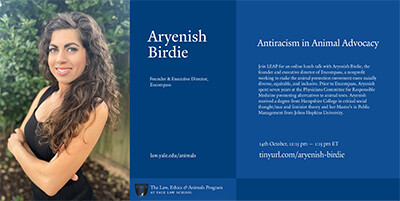
Aryenish Birdie is the founder and executive director of Encompass, a nonprofit working to make the animal protection movement more racially diverse, equitable, and inclusive. Prior to Encompass, Aryenish spent seven years at the Physicians Committee for Responsible Medicine promoting alternatives to animal tests. Aryenish received a degree from Hampshire College in critical social thought/race and feminist theory and her Master’s in Public Management from Johns Hopkins University.
This event is presented as part of the Law, Ethics & Animals Program’s speaker series, in collaboration with Yale Sustainable Food Program, the Yale Environmental Law Association, and the Yale Animal Law Society.
Regulating Greenhouse Gas Emissions from Animal Agriculture with Ben Lilliston
Thursday, October 28, 12:15 p.m. to 1:15 p.m. ET
Register here for the webinar link: tinyurl.com/lilliston
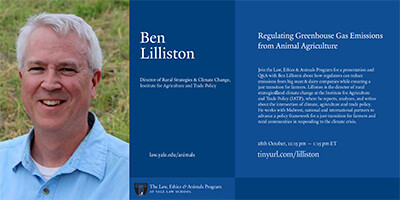
Join the Law, Ethics & Animals Program for a presentation and Q&A with Ben Lilliston about this question, moderated by Caroline Parker ’22. Lilliston is the director of rural strategies and climate change at the Institute for Agriculture and Trade Policy (IATP), where he reports, analyzes, and writes about the intersection of climate, agriculture and trade policy. He works with Midwest, national and international partners to advance a policy framework for a just transition for farmers and rural communities in responding to the climate crisis.
This event is presented as part of the Law, Ethics & Animals Program’s speaker series, in collaboration with Yale Sustainable Food Program, the Yale Environmental Law Association, and the Yale Animal Law Society.
The Ecological Risks of Deep-Sea Mining with Diva Amon, Anela Choy, and Steven Haddock
Thursday, November 4, 12:15 p.m. to 1:15 p.m. ET
Register here for the webinar link: tinyurl.com/mining-risks
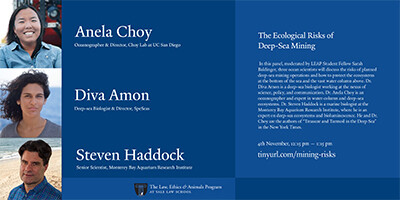
Dr. Diva Amon is a deep-sea biologist working at the nexus of science, policy, and communication. She studies the animals living in deep-sea habitats and their responses to human action.
Dr. Anela Choy is an oceanographer and expert in water-column and deep-sea ecosystems. She directs the Choy Lab at UCSD, where she researches nutrient flows in the ocean.
Dr. Steven Haddock is a marine biologist at the Monterey Bay Aquarium Research Institute, where he is an expert on deep-sea ecosystems and bioluminescence. He and Dr. Choy are the authors of “Treasure and Turmoil in the Deep Sea” in The New York Times.
This event is presented as part of the Law, Ethics & Animals Program’s speaker series, in collaboration with Yale Sustainable Food Program, the Yale Animal Law Society, the Yale Environmental Law Association, and the Yale Institute for Biospheric Studies.


